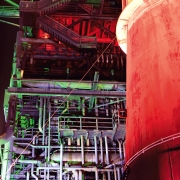Turning Greenhouse Gases into Chemicals
German Carbon2Chem aims at using emissions from steel production as raw material for chemicals. A pilot plant produces already synthetic fuel methanol and ammonia from steel mill gases.
Ammonia is a chemical used to make fertilizers to improve food production. Steel mill gases come from steel production and contain, among other things, CO2. “It is the first time in the world that steel mill gases, including the CO2 they contain, have been converted into ammonia,” ThyssenKrupp, a German multinational conglomerate with focus on industrial engineering and steel production, announced in January this year. “It represents a further milestone in the Carbon2Chem project, which is being funded by the Federal Ministry of Education and Research (BMBF) to the tune of around 60 million Euros.” Back in September 2018, the project succeeded for the first time worldwide in producing the chemical methanol from steel mill gases.
The project
Carbon2Chem is a major project coordinated by ThyssenKrupp in collaboration with institutes of the Fraunhofer Society and the Max Planck Society and involving 15 further partners from research and industry. “Implemented on an industrial scale, the technology has the potential to convert around 20 million tons of the annual CO2 emissions from the German steel sector. It can also be used in other CO2-intensive industries,” the company informed. The project Carbon2Chem is based on the fact that steel mill gases contain chemical elements such as carbon (in the form of carbon monoxide and CO2), nitrogen and hydrogen. As a result, they can be used to produce carbon- and hydrogen-containing synthesis gas, a starting material for the manufacture of various chemicals such as ammonia, methanol, polymers and higher alcohols. Synthesis gases are currently extracted from fossil fuels such as natural gas and coal. Carbon2Chem not only converts the CO2 contained in the steel mill emissions, but it also saves the CO2 that was previously created during the production of synthesis gas.
Technical Center in Duisburg
The first ammonia, as well as the first methanol production, took place in the Carbon2Chem technical center in Duisburg, a pilot plant in which laboratory results are validated under practical industrial conditions using gases from regular steel mill operation. This work forms the basis for transferring the technology to industrial scale. In addition to gas cleaning and water electrolysis systems from Thyssen-Krupp, the technical center includes various laboratory rooms, some of which are already being used by project partners: Covestro AG (research into the production of isocyanates), Clariant (catalyst for methanol production and chemicals for the gas cleaning system), the Fraunhofer Society and the Max-Planck Institute. ThyssenKrupp has invested 33.8 million Euros in the technical center, while 8.5 million Euros from the BMBF funding has also been allocated for equipment and operation.
According to the information, Carbon2Chem is attracting a great deal of interest, also from outside Europe. Worldwide, there are around 50 steel mills, that would be suitable for Carbon2Chem, the project partners are convinced. Moreover, ThyssenKrupp is already conducting talks with interested parties from various regions about how the technology could be transferred to other CO2-intensive sectors. “Carbon2Chem can make an important contribution to meeting the target formulated at the 2015 UN Climate Change Conference of achieving greenhouse gas neutrality in the second half of the century,” Thyssen-Krupp emphasized.
www.thyssenkrupp.com/en/carbon2chem
Photo: pixabay
GR 12019








